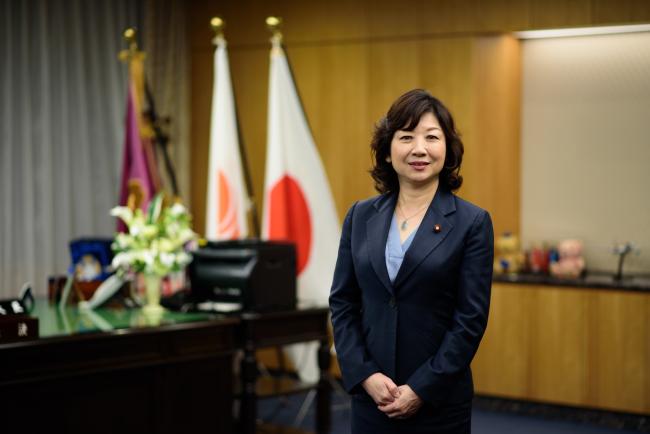 © Bloomberg. Seiko Noda Photographer: Shiho Akio Kon/Bloomberg
© Bloomberg. Seiko Noda Photographer: Shiho Akio Kon/Bloomberg(Bloomberg) — The Bank of Japan should drop its 2 percent inflation target and not further expand its program of massive monetary easing, Internal Affairs Minister Seiko Noda, a long-shot at succeeding Prime Minister Shinzo Abe, said in an interview Wednesday.
The “desperate” introduction of all sorts of policies to reach an inflation level was “back to front,” Noda said. “It will go to 2 percent by itself if the economy improves,” she added, saying failure to reach the goal was due to lack of growth in consumption and wages.
Noda, 57, who plans to run against Abe in September’s vote for leader of the ruling Liberal Democratic Party, said monetary policy was one of her biggest differences with the prime minister. Despite Abe working with the central bank for five years in pursuit of the inflation goal, prices are only rising at about half that rate.
Abe’s chances of winning re-election as leader of the long-ruling LDP have been undermined by a series of cronyism scandals and cover-ups. The possibility that he could be replaced has raised questions about how long the BOJ will maintain policies that weakened the yen, helping exporters and boosting stock prices.
“I recognize the effort, but there’s no need to continue to do unprecedented things to reach the goal of 2 percent,” Noda said at her Tokyo office. “Doing the unprecedented is a short-term thing, not something you should continue for six or seven years.”
None of 47 economists surveyed by Bloomberg expect any action at the BOJ’s policy meeting on Friday, with only seven saying they expect any change this year.
Read more on Bloomberg’s survey of BOJ watchers
Noda, who entered parliament in 1993, sought to throw her hat in the ring for the party leadership three years ago, but narrowly failed to gather the necessary 20 nominations.
A poll published by the FNN TV news network on Monday found 25.7 percent of respondents wanted former Defense Minister Shigeru Ishiba to take over as leader, while 24.4 percent favored Shinjiro Koizumi, the son of a popular former prime minister. Noda was backed by just 3.5 percent.
While she has refrained from criticizing Abe directly, Noda blames the lack of women in political power for Japan’s struggle in tackling demographic problems like its falling birthrate and aging population — both priorities of his government. She has pledged to champion diversity and put less emphasis on economic growth.
Abe Challenger Trains Women to Crack Male-Heavy Japan Parliament
Noda, who doubles as minister for women’s empowerment, has previously served as chair of the LDP’s general council. She says her own career was inspired by admiration for former U.K. Prime Minister Margaret Thatcher and a previous generation of female Japanese politicians such as Takako Doi.
Despite Japan’s slow progress on promoting women, Noda said she had the “greatest respect” for Abe’s efforts on what has been dubbed “womenomics.”
“It’s not Prime Minister Abe who is at fault, it’s Japanese customs,” she said. “Both the worlds of politics and business are at fault. They have a deeply ingrained sense that men should be in charge.”
Fusion Media or anyone involved with Fusion Media will not accept any liability for loss or damage as a result of reliance on the information including data, quotes, charts and buy/sell signals contained within this website. Please be fully informed regarding the risks and costs associated with trading the financial markets, it is one of the riskiest investment forms possible.
Source: Investing.com




























